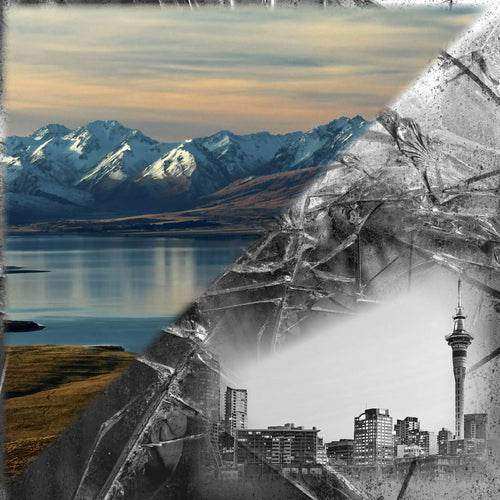
Is New Zealand Still a Safe Country?
Share
Is New Zealand a still safe country?
Is NZ Still a Safe Country? Burglary Trend and Crime Rate Analysis

Another way to look at this issue might be asking:
"Do we actually have MORE crime in NZ?"
This is something we can actually count on, and we turned to the NZ Police’s Victimisation Time and Place report portal. This system lets us see where, when, and what types of crimes have occurred, giving us a clearer picture of the crime landscape.
Before we begin, we want to emphasise the following point.
We understand that statistics can seem distant when you’ve been directly impacted by crime. No number can truly encapsulate the fear, loss, and upheaval experienced by victims. Our aim in sharing this data is not to diminish these experiences but to shed light on broader trends. Every crime is a personal tragedy, and we at Xpanda Security and DIY Xpanda remain committed to working towards a safer New Zealand where everyone feels secure in their homes and communities. It's encouraging to see a decline in certain crime categories, but we recognize that there is still much work to be done.
Index:
-
Crime Rate Analysis
-
Overall Crime Trends
-
Regional Breakdown
-
Territory-Specific Insights
-
Takeaway: What Does This Mean for Security?
-
References
-
Appendix: Security Solutions by DIY Xpanda
1. Crime Rate Analysis
For our analysis, we compared data from two periods:
- Period A: July 2022 to June 2023
- Period B: July 2023 to June 2024
We specifically focused on crimes relevant to the security solutions we offer:
- Robbery, Extortion, and Related Offences
- Aggravated Robbery
- Non-Aggravated Robbery
- Unlawful Entry With Intent/Burglary, Break and Enter
- Unlawful Entry With Intent/Burglary, Break and Enter
For the purpose of this blog, we’ll refer to these as "specific crimes."
While we aim to provide a broad view of crime trends, our primary focus is on these specific crimes because they directly impact the residential and commercial security solutions we provide.
It’s important to note that we didn’t include Theft and Related Offenses in our analysis. Although these make up a large portion of victimisation statistics, they often occur as a result of a burglary or break-in, which is already captured in the statistics.
(Reference: difference between Burglary vs Theft)

(Source: Google Map)
2. Overall Crime Trends
Firstly, how is NZ doing as a whole? Do we have more crimes or less? What kind of crimes do we have?
On page 1, you can see that the majority of the crime is theft, and "Unlawful Entry With Intent/Burglary, Break and Enter" comes in 2nd place.
On page 2, if you compare the initial month and the last month in the chart, you can see that the monthly victimisations had gone up by 682.
- 2022/07: 24650
- 2024/06: 25332
Overall, the number of victimisation has been up and down but at a rather consistent pace.
Do we have fewer crimes? The simple answer seems to be yes, but it depends on what you look at:
Overall Victimisations:
- Period A: 318,231 recorded victimisations
- Period B: 313,329 recorded victimisations
- Difference: 4,902 fewer crimes overall
Specific Crime (Robbery, Extortion, and Burglary):
- Period A: 75,358 (24% of total crimes)
- Period B: 65,473 (21% of total crimes)
- Difference: 9,885 fewer specific crimes
Property crime remains a persistent issue in New Zealand. While a slight decrease in overall victimizations is evident between Period A and Period B, this snapshot over two periods doesn't fully capture the ongoing challenges posed by property crime.
Specifically, robberies, extortions, and burglaries—categories representing a substantial portion of overall crime—have declined. However, these crimes continue to occur at alarming rates. It's crucial to recognize that while these figures indicate a small downward trend in a short timeframe, property crime remains a significant concern for New Zealanders.
A longer-term perspective is necessary to fully understand the fluctuations in property crime rates.

(Source: Korakys, CC BY-SA 4.0 <https://creativecommons.org/licenses/by-sa/4.0>, via Wikimedia Commons)
3. Regional Analysis
Crime trends can vary widely depending on the region. Here’s what we found when breaking down the data by area:
-
Gisborne Region: The only region with increases in both overall and specific crimes.
-
Overall Victimisations:
- Period A: 3,068
- Period B: 3,717
- Difference: 649 more
-
Specific Crime Victimisations:
- Period A: 848
- Period B: 951
- Difference: 103 more
-
Overall Victimisations:
-
Auckland Region: While overall victimisations have risen, specific crimes victimisations have decreased.
-
Overall Victimisations:
- Period A: 112,651
- Period B: 118,698
- Difference: 6,047 more
-
Specific Crime Victimisations:
- Period A: 24,711
- Period B: 21,748
- Difference: 2,963 fewer
-
Overall Victimisations:
-
Taranaki Region: A slight increase in specific crimes.
-
Specific Crime Victimisations:
- Period A: 1,252
- Period B: 1,305
- Difference: 53 more
-
Specific Crime Victimisations:
This regional breakdown gives us another angle to answer the question, "Is New Zealand a safe country?" Almost 35% of the country’s victimisations are concentrated in the Auckland region, indicating that more populated areas naturally experience higher crime rates.
This might be a little extra, but the below shows the victmisation trends in Auckland region.
4. Territory-Specific Analysis
- Territories with Increases in Both Overall and Specific Crime Victimisations :
- Rotorua
- Gisborne
- Hauraki
- Hurunui
- Kapiti Coast
- Mackenzie
- South Waikato
- Stratford
- Tararua
- Taupo
- Thames-Coromandel
- Upper Hutt
- Wairoa
- Territories with Increases in Overall Victmisations Only:
- Auckland
- Chatham Islands
- Clutha
- Gore
- Manawatu
- Porirua
- Queenstown-Lakes
- Rangitikei
- Western Bay of Plenty
- Westland
- Territories with Increases in Specific Crime Victmisations Only:
- Central Hawke's Bay
- South Taranaki
- South Wairarapa
- Whakatane

(Source: Dan Freeman danfreemanphoto)
5. Takeaway: Is NZ still safe?
While it might feel like we’re hearing more about street violence, burglaries, and even shootouts, the data suggests that overall victimisation is either declining or relatively stabilising. Specific crimes, which constitute a significant portion of total crime, are also decreasing, particularly in densely populated areas.
However, not all crime categories have improved. When comparing the two periods, we noticed increases in two specific areas:
-
Theft and Related Offenses:
- Period A: 211,507
- Period B: 215,667
- Difference: 4,160 more
-
Acts Intended to Cause Injury:
- Period A: 30,401
- Period B: 31,263
- Difference: 862 more
So, is New Zealand a safer country in terms of crime rates?
"Yes"
Although that depends on which time frame and region you compare.
AND
there’s always more we can do to enhance safety.
The majority of crimes in NZ still involve theft and unlawful entry. Getting robbed or having your house or business broken into can cause serious long term mental and financial damage.
The best security lies in prevention and deterrence, and we’re here to help anyone, anytime.
Finally, we sincerely extend our best wishes to all the victims of these crimes, and offer our kudos to the New Zealand police and everyone tirelessly working to fight and prevent them.

(Source: Tobias Keller tokeller)
6. References:
- NZ Police Victimisation Time and Place:
- Policedata.nz:
- Difference Between Robbery and Theft:
7. Appendix:
We DIY Xpanda provide a variety of products to help prevent criminals committing burglaries, robberis, home invasions, ram raids, and break-ins.
We have a great size range of window bars, expandable barriers, bollards, security gates, and locks (such as pet lock latches & anti-jemmy plates).
If you cannot find a product that matches your size demand, consider consulting with a custom-designed security solution provider with Xpanda Security for a free consultation and assessment.

